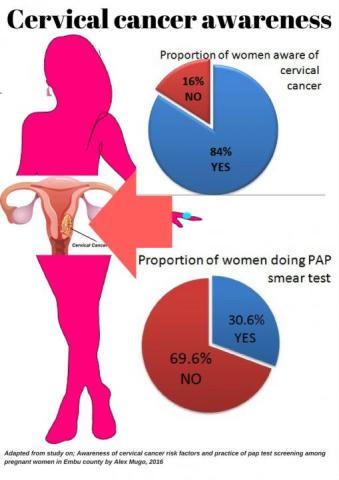
 Lack of awareness among women about the Pap smear test, and lack of knowledge on the causes of cervical cancer has been blamed for high number of women developing the disease in Kenya. These are the findings of a study conducted at Embu Level V Hospital, Embu by Alex Mugo, the principal investigator. The study carried out between June and December, 2016, investigated 346 pregnant women aged between 18 – 45 years who were attending the hospitals’ ANC clinic. While majority (84%) of the women were aware of cervical cancer, only a paltry third (30%) had ever done a PAP smear test, the study showed.
Lack of awareness among women about the Pap smear test, and lack of knowledge on the causes of cervical cancer has been blamed for high number of women developing the disease in Kenya. These are the findings of a study conducted at Embu Level V Hospital, Embu by Alex Mugo, the principal investigator. The study carried out between June and December, 2016, investigated 346 pregnant women aged between 18 – 45 years who were attending the hospitals’ ANC clinic. While majority (84%) of the women were aware of cervical cancer, only a paltry third (30%) had ever done a PAP smear test, the study showed.
Cervical cancer is the second most common cancer and the leading cause of cancer deaths among women aged between 15 -49 years in Kenya today killing as many as 1700 women every year. The main cause of the disease is infection by Human Papilloma Virus (HPV) mostly serotypes 16 and 18. HPV is transmitted through skin to skin contact including sex intercourse. Other possible contributing factors are tobacco smoking, multiple sexual partners, low immunity, Chlamydia infection, poor dietary habits, oral contraceptives use, poverty, family history of the disease, multiple pregnancies and early age of first pregnancy.
The study found that only 42% of the women were aware of cervical cancer screening test, the PAP smear, which is conducted to detect early forms of cervical cancer which can be successfully cured through surgery. Over three quarter (77%) of the women were not aware of most of the causative factors of the disease. Women who, were aware of the causative factors of the disease, were older, more educated and had health insurance were more likely to be tested.
The study also found that some main reasons why women failed to undergo testing included, lack of knowledge about the test, unawareness of where to go for the testing and lack of funds to conduct the test. Twenty one (6.6%) of the women participating in the study, were found to have abnormal lesions in the cervix that would lead to cervical cancer in future.
The study recommended that there was need to educate women of reproductive age on the causes of cervical cancer, and the importance of screening with PAPs smear test. It recommended incorporation of cervical cancer screening and treatment to the ongoing Maternal Child health programs. It also recommended collaboration of many stakeholders and the development of national and local policies targeting screening and treatment of the disease.
Cervical cancer can be prevented by screening and treatment of the early forms of the disease through a PAP smear test which is recommended to women from 21 years old. Other screening methods include visual inspection of the cervix and HPV DNA testing. The other method of preventing cervical cancer is vaccination against the HPV infection which mostly targets girls and women aged from 11 to 26 years.
“Unnecessary suffering and death will only be prevented when all women and girls are provided access to information, services and tools to prevent cervical cancer,” says Alex, the PI, who conducted the published study as a thesis for a master’s program at Jomo Kenyatta University of Agriculture and Technology, Kenya.
References
1. Alex Mugo, Joseph Gikunju, Peter Wanzala (2017). Awareness of cervical cancer risk factors and practice of pap test screening among pregnant women in Embu county.